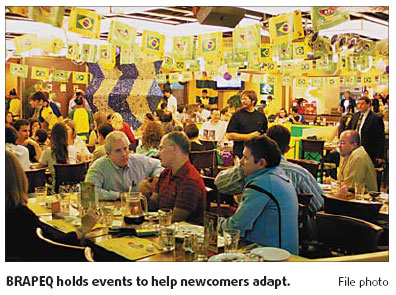Introducing Brazil to Beijing's little Brazilians
Brazilians in Beijing are finding it takes a global village to raise a child.
BRAPEQ (Brazilians in Beijing) cofounder Raquel Martins, who has lived in China for 38 years and brought up three kids in the capital with her Swiss husband, says she founded the group partly to help her children - Karolina, 17, and twins Valtter and Idalina, 14 - understand their heritage.
"If I don't show my children the Brazilian flag and teach them the national anthem, they'll only be proud to be Brazilian every four years when there's a World Cup," Martins says.
She says it's different for Brazilians than for people from English-speaking countries, whose culture pervades the international media.

And a lot of newly arrived adults from Brazil also need the help BRAPEQ, which now has more than 600 members, has been providing since its 2007 founding.
"We get some calls from people crying, saying, 'I need help'," she says.
"Many people are shocked when they first come to China, mostly because they can't read, they can't write, they can't talk, can't communicate at all. This shock's very big for Brazilians, because (most) don't speak English."
The group emphasizes the similarities between the two cultures - closeness of extended family, responsibility toward elders, sense of face and even similar cuisine - to help newcomers adapt.
BRAPEQ hosts events introducing China to Brazilians, such as lectures and trips. It also hosts Brazilian events, like Carnival, Festa Junina and a weekly happy hour, to bring Brazilians together and engage in their homeland's culture, while also introducing it to their children, Chinese and other foreigners.
BRAPEQ volunteer Iolanda Comptdaer says these events are important to her family, especially the two of her three children - Rafael, 13, and Gabriella, 11 - who live in Beijing.
"My kids can meet other kids who are Brazilian, eat our food and speak Portuguese," says Comptdaer, who has lived in China for four years.
Joao Lemos, who works for Embraco in Shunyi district and has lived in China for about 8 years, says his 12-year-old daughter Giulia speaks English and Chinese better than Portuguese.
"But her Portuguese is good, too, and a lot of it came from the group."
BRAPEQ member Simone deLaTour, who has lived in China for 10 years, coordinates activities between BRAPEQ and the Sino-Brazilian Academic Exchange Center (IASB), which brings Brazilian scholars to China.
"(Brazilians) sometimes come with a negative impression of China but that changes," deLaTour says.
"That says a lot about the Chinese people."
She said she believed last week's meeting between the two countries' leaders would help the center's work.
Lemos also believes the meeting would boost ties, which are important to him as a Brazilian living in China.
"China and Brazil are both developing countries in almost the same stages," Lemos says.
"We can learn many things from each other. The future belongs to us."
(China Daily 07/20/2009 page10)














